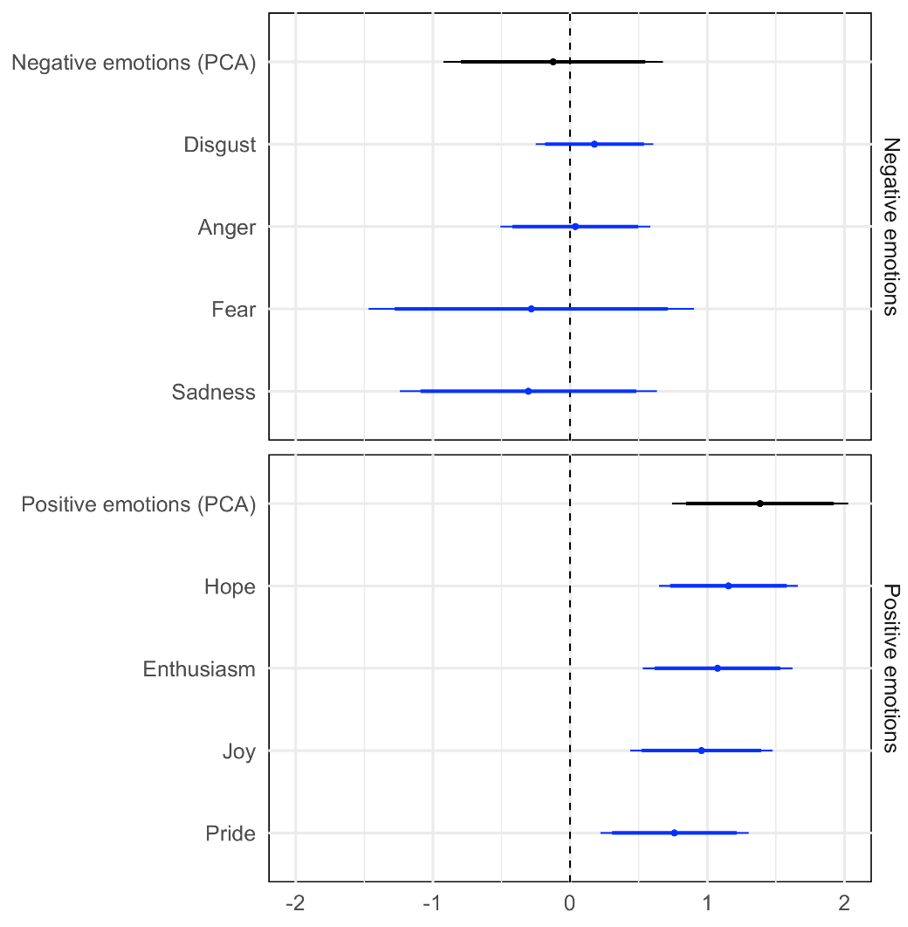How does the success of a radical right party affect the rhetoric of other political parties? Drawing on a new study, Vicente Valentim and Tobias Widmann assess how the rise of the AfD in Germany influenced the speeches made by other German politicians. They find that far from adopting the rhetoric of the radical right, politicians from other parties were more likely to express positive emotions to distance themselves from the AfD.
Radical right politicians have experienced increasing success in recent years in various countries around the world. One characteristic of these parties is their distinct way of communicating. They are known for their negative – and at times even offensive – rhetoric which draws on emotions such as anger, fear, or disgust. But what are the implications of this new way of debating for wider politics within a country? Do other parties change their tone and become more negative as well?
On the one hand, mainstream parties might be tempted to turn negative themselves. Perceiving the distinctive radical right rhetoric as a ‘winning strategy’, these parties might wish to copy this form of communication to increase their future electoral success. On the other hand, they may feel that the radical right has ownership over that kind of rhetoric and, instead, try to build a contrast between the rhetoric of the radical right and their own.
This might be a more profitable strategy for established politicians since they can reinvent themselves around the kind of rhetoric they already have ownership of, which is significantly more positive. It could additionally help mainstream politicians to limit future electoral gains by the radical right. Negative emotions have been shown to affect citizens’ decision-making and increase the electoral support for the populist right.
In a recent study, we sought to resolve these questions by investigating the success of radical right parties on the overall tone of the political debate within a country. To analyse the impact of the radical right, we collected an original dataset of all speeches in German state parliaments between January 2014 and June 2019. We then analysed these speeches using an original dictionary that was built to capture discrete emotions in German political texts. This new dictionary can measure words associated with distinct negative emotions (anger, fear, disgust, sadness) and positive emotions (joy, enthusiasm, pride, hope).
We drew upon the case of Germany due to its federal system, where each state has its own parliament. Elections for these parliaments are not synchronised, which allowed us to take advantage of variation in their timing to look at the effect of the entry of the newly successful radical right party, the Alternative für Deutschland (AfD).
Our results clearly show that other politicians do not copy the negativity of the radical right. Instead, our findings indicate that German politicians reacted to the success of the AfD by making their own political discourse more positive. Exposure to members of the radical right increased language associated with hope, enthusiasm, joy, and pride. In turn, there was no impact on their use of negative emotions. For a visualisation of the impact of the AfD on the rhetoric of the remaining politicians, see Figure 1.
Figure 1: Impact of the AfD on the rhetoric of other German politicians
Note: The figure demonstrates how exposure to the rhetoric of the AfD affected the rhetoric of other politicians within a state parliament. A positive value indicates that these politicians were more likely to use language that is associated with the emotion shown on the left side of the figure. The horizontal bars display confidence intervals. As can be seen in the bottom chart, all four positive emotions are located entirely above 0, which indicates that the effect of the AfD on other politicians was to significantly increase the use of language associated with positive emotions. In contrast, there appears to be no significant impact on the frequency with which other politicians used language associated with negative emotions.
This raises the question of what the mechanism is that drives this finding. Our argument is that politicians may increase their use of positive emotions strategically, in order to distance themselves from the rhetoric of the radical right. In so doing, they can present themselves as defenders of the democratic norms that are breached by radical right politicians and their rhetoric.
We tested this assumption by comparing effect sizes between parties. This test indicates that mainstream politicians show larger effects compared to politicians of the populist-left party Die Linke. Furthermore, among mainstream politicians, the effect is stronger for left-wing politicians. These findings are in line with our assumptions as they indicate that politicians whose values are more threatened by the negative, norm-breaching discourse of the radical right distance themselves even further.
Further examining speeches in a qualitative fashion, we found additional evidence supporting our assumption. There were many instances of politicians criticising the AfD for its way of debating and doing politics. Furthermore, using positive emotions, mainstream politicians distanced themselves from this behaviour. At the same time, these positive emotions – hope and enthusiasm in particular – have been used to mobilise support from citizens against the radical right.
In sum, our results provide evidence that radical right success does not lead to increased levels of hostile rhetoric in parliamentary debates. We show that other politicians rely increasingly on positive emotions to distance themselves from the norm-breaching behaviour of the radical right. Considering the detrimental consequences of negative political rhetoric, these findings might provide hope as they suggest that mainstream politicians do not fuel the spread of negativity. Instead, they affirm their commitment to the democratic norms that the radical right breaches.
For more information, see the authors’ accompanying paper in Political Behavior
Note: This article gives the views of the authors, not the position of EUROPP – European Politics and Policy or the London School of Economics. Featured image credit: AfD Sachsen (CC BY-NC 2.0)



